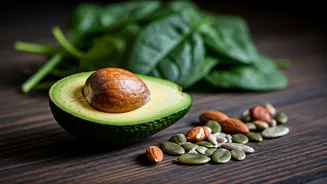Leafy Green Power
Leafy green vegetables are packed with nutrients crucial for cardiovascular well-being. These greens are rich in vitamins, minerals, and antioxidants,
all contributing to overall health. For example, spinach and kale are filled with vitamins like K and folate, both known to support arterial function. These vegetables also offer dietary fiber, which helps reduce cholesterol levels. Regular consumption of leafy greens can contribute to lower blood pressure and reduced inflammation, thus playing a significant role in preventing heart ailments. Additionally, the nitrates present in these greens may boost the production of nitric oxide, which widens blood vessels, promoting better blood flow.
Nuts and Seeds Benefits
Nuts and seeds represent another crucial food group for promoting heart health. Packed with healthy fats, fiber, and various minerals, these additions to your diet can significantly improve cardiovascular function. Almonds and walnuts are excellent sources of monounsaturated fats, which are known to reduce bad cholesterol levels. Seeds, like flaxseeds and chia seeds, are rich in omega-3 fatty acids, which play a crucial role in reducing inflammation and preventing blood clots. Regularly consuming a mix of nuts and seeds can lead to lower blood pressure, improved blood vessel health, and a decreased risk of heart-related diseases. Consider incorporating a handful of mixed nuts or a sprinkle of seeds into your daily meals for optimal benefits.
Whole Grain Advantage
Whole grains are another important component of a heart-healthy diet. Unlike refined grains, whole grains retain their bran, germ, and endosperm, providing a wider array of nutrients and fiber. Oats, brown rice, and quinoa are excellent choices, offering sustained energy and supporting cardiovascular health. The fiber content in whole grains helps lower LDL cholesterol, reducing the risk of plaque buildup in the arteries. Regular consumption of these grains also helps regulate blood sugar levels, reducing the risk of diabetes, a significant risk factor for heart disease. Furthermore, whole grains contribute to feeling fuller for longer, aiding in weight management, which in turn reduces stress on the heart.
Avocado's Role
Avocados stand out as a delicious and beneficial addition to a heart-healthy diet. Rich in monounsaturated fats, avocados help lower LDL cholesterol while increasing levels of good cholesterol, also known as HDL cholesterol. This unique fat profile is key to supporting arterial health and preventing the buildup of plaque. Furthermore, avocados are packed with potassium, an essential mineral for regulating blood pressure. Including avocado in your meals can contribute to improved blood vessel function and reduced risk of heart attacks and strokes. Enjoying avocado in salads, on toast, or as a creamy addition to various dishes is a tasty way to improve your heart health.
Dietary Integration Strategies
Incorporating these plant-based foods into your daily routine is simple and effective. Begin by adding a serving of leafy greens to your meals, such as a salad with lunch or cooked spinach with dinner. Snack on a handful of nuts and seeds throughout the day instead of processed snacks. Swap refined grains for whole grains like brown rice or quinoa in your meals. Add avocado slices to your breakfast toast or sandwiches. These small, sustainable changes can lead to considerable improvements in heart health. Remember to consult with a healthcare professional or a registered dietitian to tailor your diet to your specific needs and ensure you are getting the full benefits of these heart-healthy foods.















